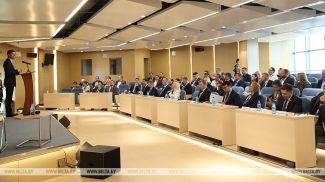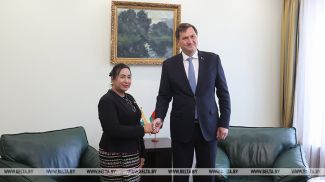MINSK, 14 April (BelTA) – New investment projects and manufacturing enterprises are needed for the sake of development of economies in the regions. Belarusian Deputy Economy Minister Anzhelika Nikitina made the statement before a seminar on problems of the accelerated development of the regions populated by 80,000 people and more and ways to resolve them began on 14 April, BelTA has learned.
According to the source, new investment projects, new enterprises, and the creation of new high-performance jobs represent the development of the economy in any region.
In her words, in the current five-year term cities with the population of 80,000 people and more will become drivers of regional development. “It is a matter of pressing interest because 2020 was the final year for implementing plans for the comprehensive development of ten regions with the population of 80,000 people and more (the Orsha District program will be finished in 2023). Over 2,000 measures and projects have been implemented and about Br7.5 billion has been invested. Nevertheless, we see no accelerated development of such cities. Our main task is to find out what interfered with these plans, what growth points we failed to take into account as we worked out comprehensive programs on the development of the regions,” Anzhelika Nikitina stressed.
According to the source, it is necessary to find out what needs to be done to start an investment cycle in these cities considering there are industrial sites and infrastructure over there. It is necessary to find out how to rehabilitate the enterprises, which performance is not quite effective. It is necessary to find out what impedes the development of the regions from the point of view of land ownership and management. “A resolution we are going to follow in the future will be the result. I think today's meeting is not the last one and we will continue interacting on the basis of concrete regions,” she added.
As for the infrastructure of manufacturing sites in the regions, some difficulties have been encountered. “Some enterprises were built back in the USSR time. Today their premises cannot be used to make new high-tech import-substituting products. We will discuss these matters with the administrations of these regions at the seminar, in particular, the demolishing, conservation, and re-integration of these facilities into the economy,” Anzhelika Nikitina noted. “Apart from that, we are already working with the National Agency of Investment and Privatization on passports for such industrial sites for the sake of reintegrating them into the economy.”
The deputy economy minister also explained that only a handful of the cities populated by 80,000 people and more have their own higher education institutions or their branches. “It is necessary to think about setting up branches of higher education institutions for the sake of preserving the competences the development of industrial enterprises in these cities needs. We want young people to work at the local enterprises instead of leaving,” Anzhelika Nikitina stressed.













